Real Earnings of Private Employees Declined Again in May
Economics / Wages Jul 08, 2014 - 03:05 PM GMTBy: PhilStockWorld
 Courtesy of Doug Short. Here is a look at two key numbers in last week’s monthly employment report for June:
Courtesy of Doug Short. Here is a look at two key numbers in last week’s monthly employment report for June:
- Average Hourly Earnings
- Average Weekly Hours
The government has been tracking the data for Production and Nonsupervisory Employees for decades. But coverage of Total Private Employees only dates from March 2006.
Let’s examine the broader series, which goes back far enough to show the trend since before the Great Recession. I want to look closely at a five-snapshot sequence.
First, here is a chart of the Average Hourly Earnings. I’ve included a linear regression through the data to highlight the trend. Hourly earnings increased at a faster pace through 2008, but the pace slowed from early 2009 onward.
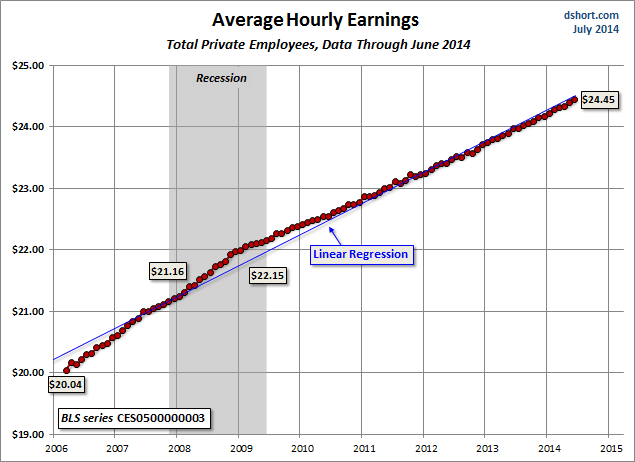
But the hourly earnings above are nominal (not adjusted for inflation). Let’s look at the same data adjusted for inflation using the Consumer Price Index. Since the government series above is seasonally adjusted, I’ve used the seasonally adjusted CPI, and I’ve chained the series to the dollar value of the latest month of hourly wages so that the numbers reflect the purchasing power in today’s dollars. Since an official CPI for the most recent month hasn’t been released, I’ve extrapolated that value from the percent change of the two previous months. As we see, the difference is amazing.
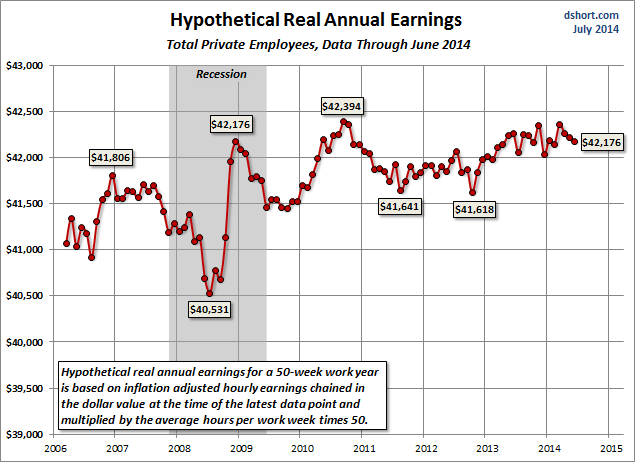
The decline in real wages at the onset of the recession accords with our expectations. But why the rise in the middle of the recession when the Financial Crisis began unfolding in earnest? Let’s add another data series to the mix: Average Hours per Week. About eight months into the recession, hours per week began to fall. The number bottomed a few months before the recession ended and then began increasing a few months after it ended.
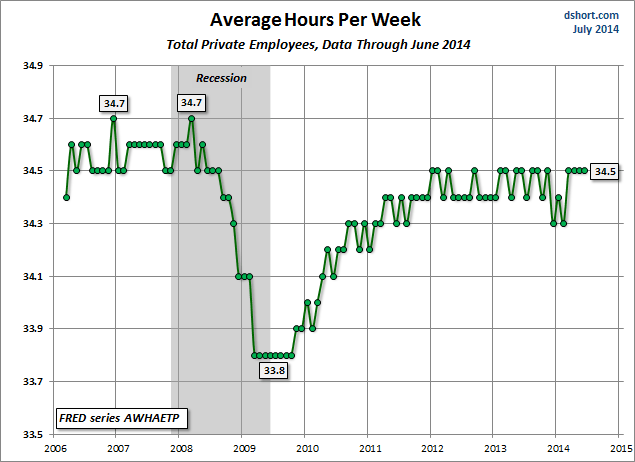
For a better understanding of the relationship between hourly earnings and the average work week, let’s overlay the two. We see a striking inverse correlation during the Financial Crisis. And by the Fall of 2010, the two began to reverse their directions.
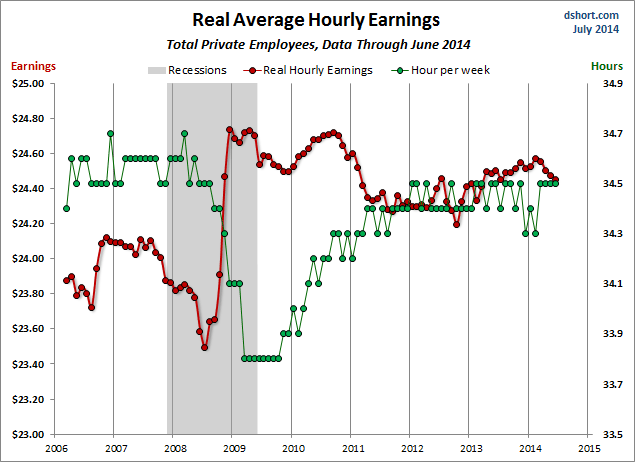
The next chart multiplies Real Average Hourly Earnings times the Average Hours Per Week for a snapshot of the trend in weekly wages.
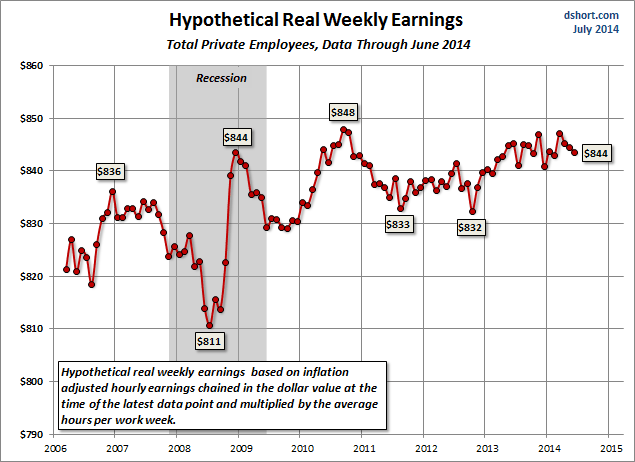
Finally, let’s create a snapshot of hypothetical expected real annual earnings by multiplying the weekly earnings times 50 (yes, a couple of weeks of unpaid vacation).
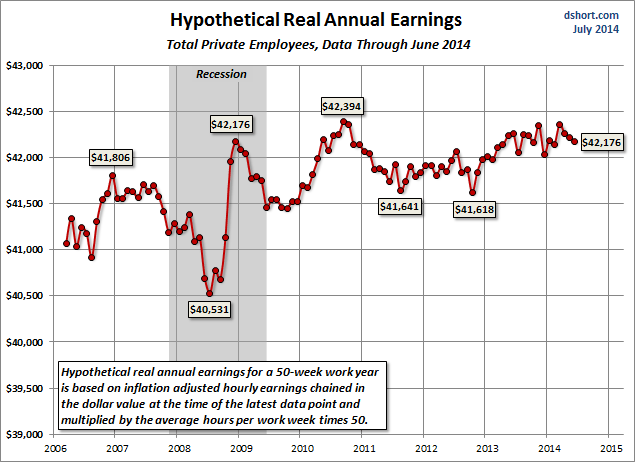
The key word in the chart title is “hypothetical” because among the various factors not included in our calculation is the fact that the employed population is constantly changing, and the rate and types of change accelerate in proximity to recessions. Employees are terminated, shifted to part-time or replaced by part-time employees. During recoveries, new employees are added.
The Great Recession is now well behind us. But the last chart above offers a reminder of the sluggishness of the recovery at this point — approaching five years after the recession ended. The post-recession real annual earnings peaked in September 2010, hit an interim low in August 2011 and a lower low in October 2012. It subsequently rebounded in March of this year to an interim high just below the 2010 peak. The last two months have registered small declines.
In Summary…
- Nominal average hourly earnings are up a six cents from the previous month.
- Real average hourly earnings are 29 cents below the December 2008 high.
- Hypothetical real weekly earnings are $4.36 below the previous high in September 2010.
- Hypothetical real annual earnings are $218 below the September 2010 peak.
- Phil
Philip R. Davis is a founder of Phil's Stock World (www.philstockworld.com), a stock and options trading site that teaches the art of options trading to newcomers and devises advanced strategies for expert traders. Mr. Davis is a serial entrepreneur, having founded software company Accu-Title, a real estate title insurance software solution, and is also the President of the Delphi Consulting Corp., an M&A consulting firm that helps large and small companies obtain funding and close deals. He was also the founder of Accu-Search, a property data corporation that was sold to DataTrace in 2004 and Personality Plus, a precursor to eHarmony.com. Phil was a former editor of a UMass/Amherst humor magazine and it shows in his writing -- which is filled with colorful commentary along with very specific ideas on stock option purchases (Phil rarely holds actual stocks). Visit: Phil's Stock World (www.philstockworld.com)
© 2014 Copyright PhilStockWorld - All Rights Reserved Disclaimer: The above is a matter of opinion provided for general information purposes only and is not intended as investment advice. Information and analysis above are derived from sources and utilising methods believed to be reliable, but we cannot accept responsibility for any losses you may incur as a result of this analysis. Individuals should consult with their personal financial advisors.
PhilStockWorld Archive |
© 2005-2022 http://www.MarketOracle.co.uk - The Market Oracle is a FREE Daily Financial Markets Analysis & Forecasting online publication.



